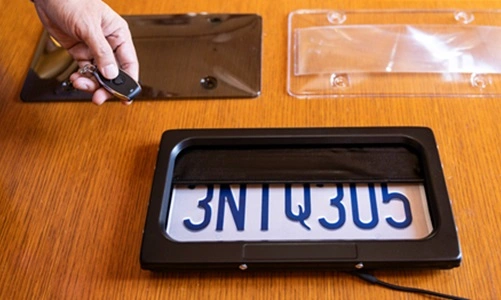Yes, it is illegal to paint your license plate in the United States. State laws mandate that license plates must remain legible, unaltered, and visible at all times to ensure accurate identification of vehicles. Altering a license plate in any way, including painting it, is considered tampering and can result in fines, citations, or even criminal charges.
Why Painting a License Plate Is Illegal
- License Plate Tampering Laws
- Most states prohibit any modification to a license plate that obscures or alters its original appearance. Painting the plate can change its reflective surface, numbers, letters, or design, making it difficult for law enforcement or traffic cameras to read.
- State-Issued Property
- License plates are state-issued property, and altering them is considered unauthorized modification. Drivers are required to use plates as issued by the Department of Motor Vehicles (DMV).
- Interference with Traffic Enforcement
- Painting a license plate can make it harder for toll, red-light, and speed cameras to capture accurate images, which may be treated as an attempt to evade enforcement.
- Public Safety Concerns
- Clear and legible license plates are essential for identifying vehicles in emergencies, accidents, or crimes. Painting a plate compromises this functionality.
Legal Consequences of Painting a License Plate
- Fines and Citations
- Altering a license plate, including painting, typically results in fines ranging from $50 to $500, depending on the state.
- License Suspension or Revocation
- In some states, repeated violations can lead to the suspension or revocation of the vehicle registration.
- Criminal Charges
- Intentional tampering, especially to evade tolls or traffic enforcement, can result in misdemeanor or felony charges, depending on the severity of the offense.
- Vehicle Impoundment
- Law enforcement may impound vehicles with tampered plates until proper plates are issued.
State Examples of Plate Tampering Laws
- California
- California Vehicle Code §5201 prohibits altering or obscuring license plates. Painting a plate to change its reflectivity or appearance is a violation, punishable by fines.
- Texas
- Under Texas Transportation Code §504.945, altering a license plate, including painting, is illegal. Violations can result in fines or legal action.
- New York
- New York’s vehicle laws explicitly ban any modification to license plates, including repainting, that affects their readability.
Common Scenarios Where Painting Plates May Occur
- Restoring Damaged Plates
- Drivers may consider repainting faded or damaged plates to restore their appearance. However, this is illegal. Instead, drivers should request replacement plates from the DMV.
- Customizing Plates
- Some individuals may paint their plates to match their vehicle or for aesthetic reasons. Customizing state-issued plates in this way is prohibited.
- Covering Wear and Tear
- While weathered plates may seem like a valid reason for painting, any modification still violates state laws. Most DMVs offer replacements for damaged plates.
Legal Alternatives to Painting a Plate
- Request a Replacement Plate
- If your license plate is damaged or faded, you can request a replacement from your local DMV. Fees for replacements vary by state.
- Vanity or Specialty Plates
- For customization, consider purchasing vanity or specialty plates through your state’s official channels.
- License Plate Frames
- Use decorative frames or covers that comply with state laws and do not obscure any part of the plate.
Related FAQs
Q1. Can I repaint a faded license plate?
Ans: No, repainting a faded plate is illegal. You should request a replacement from your DMV.
Q2. What happens if I paint my license plate?
Ans: Painting your plate can result in fines, citations, or even criminal charges for tampering with state-issued property.
Q3. Can I use touch-up paint to fix scratches on my plate?
Ans: No, any modification to the plate, even minor, is prohibited by law. Obtain a replacement plate instead.
Q4. Are there exceptions for antique or classic plates?
Ans: Antique or classic plates may have unique regulations, but repainting them without state authorization is generally illegal.
Q5. How can I customize my license plate legally?
Ans: Purchase a vanity or specialty plate through your state’s DMV to customize your plate within legal boundaries.
Conclusion
Painting a license plate is illegal in the U.S. and is considered tampering with state-issued property. Such actions can lead to fines, legal penalties, and potential issues with law enforcement. Drivers with damaged or faded plates should seek replacements from their DMV rather than attempting to repaint or modify their plates. Legal alternatives like vanity plates provide safe and compliant options for personalization.


